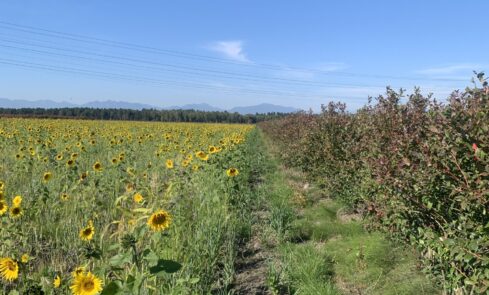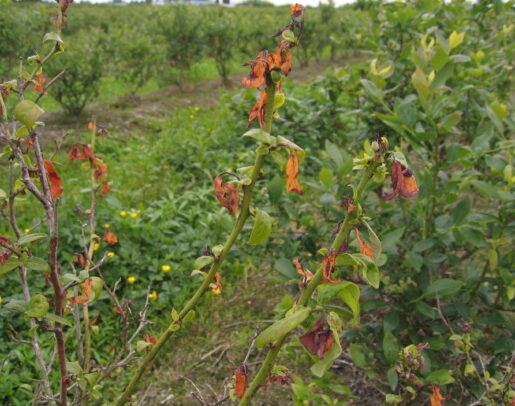Blueberry Rest Program
What Is It?
DFWT partners with blueberry growers who have bare soil following the removal of blueberry plants. Participants plant pollinator set-asides of flowers, grasses and broad-leaved plants, then leave them to rest for up to 4 years. The resting fields are replenished with vital nutrients over time while supporting pollinators. The set-asides also provide ecosystem services for the larger community, such as carbon storage, water filtration, pollination of neighbouring fields and gardens, biodiversity, and birdwatching opportunities.

How Does It Benefit Wildlife?
These pollinator set-asides resemble the tall-grass habitats that used to exist in the Fraser River Estuary before it was diked and drained for agriculture in the late 1800s. The fields also provide safe hunting grounds away from roadsides for species-at-risk such as Barn Owls and Barn Swallows.
How Does It Benefit Farmers?
Farmers typically enroll in the Blueberry Rest Program to restore degraded land and prepare the soil for future blueberry plantings. Scorch virus (BIScV) has been impacting blueberry plants in the Fraser Valley. All highbush blueberries grown in BC are susceptible to BIScV. Scorch virus spreads through winged aphids and infected planting stock. Infected plants show symptoms one to two years following infection and will generally die within three years.
Scorch does not pose a risk to human health, but can have devastating impacts on blueberry fields. If scorch is detected, the provincial recommendations are to remove plants immediately. This program supports growers who have had to remove large sections of their blueberry fields.

When previous blueberry fields are planted with pollinator set-asides, they help to:
- rebuild soil texture, infiltration and organic matter with nitrogen fixers and deeply rooting species
- support local pollinator populations by providing flowering resources within berry fields while blueberries are not in bloom
- reduce disease transfer from scorch virus by buffering healthy blueberry bushes
- provide soil cover over winter to reduce erosion, suppress weeds and prevent standing water in fields.
How Do DFWT And Farmers Work Together To Deliver The Program?
Farmers plant fields with the recommended flowers, grasses and broad-leaved plants. For every year that a field is enrolled in the Blueberry Rest Program, the farmer receives a per acre cost-share from DFWT to help with the cost of planting and managing the set-aside, and to offset the costs of temporarily removing the land from production.
What Our Research Shows:
- A study that evaluated the benefits of short-term set-asides on Delta farmland concluded that short- to medium-term (2 to 4 year) GLSAs positively affected soil quality, improving soil structure and compaction in productive fields after two years, and in unproductive fields after three years.
- Studies have shown that increasing semi-natural habitat on farmland can increase yields of pollinator-dependent crops.
Want To Learn More?
DFWT has conducted several studies to assess the benefits of set-asides on soil productivity and wildlife. You can find them here.
Funding has been provided by the governments of Canada and British Columbia through the Sustainable Canadian Agricultural Partnership, a federal-provincial-territorial initiative.
How Can You Help?
Your donation will work towards conserving important farmland and wildlife resources contained in the Fraser River delta.
